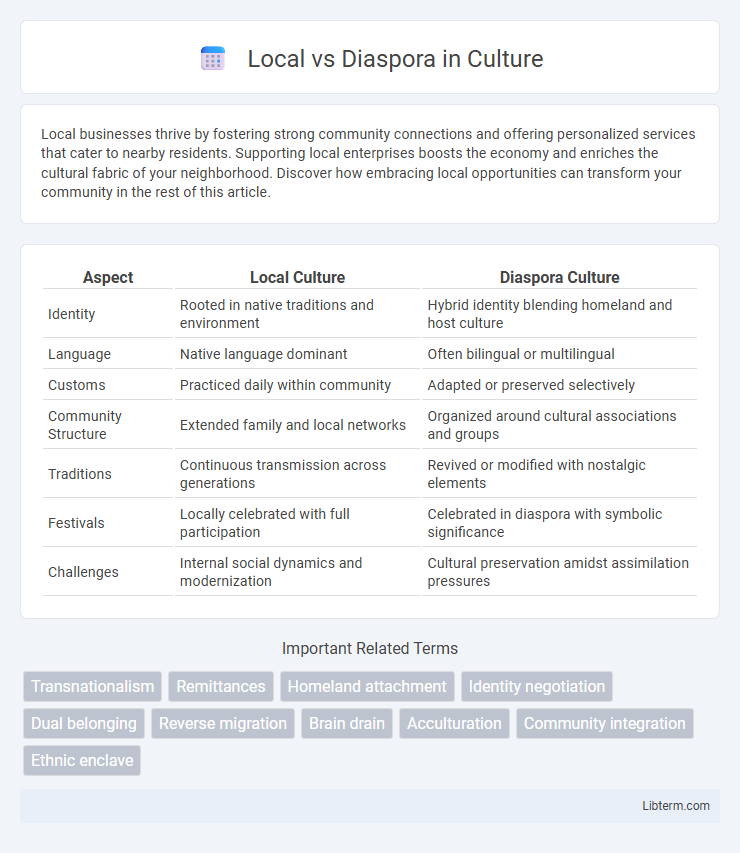Local businesses thrive by fostering strong community connections and offering personalized services that cater to nearby residents. Supporting local enterprises boosts the economy and enriches the cultural fabric of your neighborhood. Discover how embracing local opportunities can transform your community in the rest of this article.
Table of Comparison
| Aspect | Local Culture | Diaspora Culture |
|---|---|---|
| Identity | Rooted in native traditions and environment | Hybrid identity blending homeland and host culture |
| Language | Native language dominant | Often bilingual or multilingual |
| Customs | Practiced daily within community | Adapted or preserved selectively |
| Community Structure | Extended family and local networks | Organized around cultural associations and groups |
| Traditions | Continuous transmission across generations | Revived or modified with nostalgic elements |
| Festivals | Locally celebrated with full participation | Celebrated in diaspora with symbolic significance |
| Challenges | Internal social dynamics and modernization | Cultural preservation amidst assimilation pressures |
Understanding the Terms: Local vs Diaspora
Local refers to individuals residing within their native country or community, maintaining direct cultural, social, and economic ties to their place of origin. Diaspora denotes populations living outside their ancestral homeland, often sustaining distinct cultural identities while adapting to their host countries. Understanding the terms involves recognizing the differing experiences, connections, and impacts of these groups on both local and global scales.
Historical Context of Local and Diaspora Communities
Local communities have deep roots shaped by centuries of cultural practices, traditional knowledge, and sustained interaction with their geographic environment. Diaspora communities often emerge from migration patterns driven by economic, political, or social upheavals, maintaining connections to their homeland while adapting to new sociocultural settings. Historical context reveals that local groups preserve indigenous languages and customs, whereas diaspora populations play crucial roles in transnational networks and cultural diffusion.
Cultural Identity: Homegrown vs Abroad
Cultural identity differs significantly between local and diaspora communities, where homegrown individuals maintain traditions rooted in their immediate environment while those abroad often blend native customs with influences from their host countries. Diaspora populations experience a dynamic cultural identity shaped by both preservation of heritage and adaptation to new social contexts, resulting in hybrid expressions of culture. Local communities emphasize continuity and direct transmission of customs, whereas diaspora groups foster transnational connections that redefine cultural belonging across borders.
Economic Contributions: Locals and Diaspora
Local populations contribute to the economy primarily through direct consumption, labor, and support for small businesses within their communities, reinforcing regional economic stability. Diaspora communities bolster local economies via remittances, foreign investments, and knowledge transfer, fostering innovation and international trade links. Both groups' economic contributions are essential for sustained development, blending grassroots growth with global financial inflows.
Political Influence: Comparing Local and Diaspora Roles
Local political influence stems from direct engagement with community governance, policy implementation, and grassroots mobilization, enabling immediate impact on regional decision-making. Diaspora populations leverage transnational networks, financial resources, and international advocacy to shape homeland politics indirectly through lobbying, funding political campaigns, and influencing foreign policy. Both local and diaspora roles are critical, with locals driving day-to-day political actions and diaspora communities amplifying global awareness and support.
Social Dynamics: Connecting Local and Diaspora Networks
Local and diaspora networks create dynamic social ecosystems by enabling resource exchange, cultural preservation, and collective advocacy. Social interactions within these networks facilitate transnational collaborations that strengthen community resilience and economic development. Connecting local and diaspora communities fosters mutual support systems that enhance identity affirmation and social capital across geographical boundaries.
Challenges Faced by Locals and Diaspora Members
Locals often encounter challenges such as limited access to resources, political instability, and economic hardships that restrict community development and personal growth. Diaspora members face difficulties including cultural disconnection, identity struggles, and barriers to effective engagement with their homeland due to geographical distance. Both groups must navigate these obstacles to foster meaningful contributions and maintain strong ties across borders.
Opportunities for Collaboration Between Local and Diaspora
Collaboration between local communities and diaspora groups unlocks immense opportunities for economic development, cultural exchange, and knowledge transfer. Shared projects leveraging diaspora expertise and local resources foster innovation, enhance infrastructure, and boost entrepreneurship in home countries. Establishing formal networks and communication platforms strengthens partnerships, promotes investment, and catalyzes sustainable growth across sectors.
Bridging the Gap: Strategies for Unity
Bridging the gap between local and diaspora communities involves fostering inclusive communication channels and creating collaborative platforms that leverage shared cultural heritage and economic interests. Strategies such as diaspora engagement programs, investment incentives, and joint cultural initiatives enhance mutual understanding and empower collective development. Establishing transparent dialogue mechanisms and facilitating knowledge transfer ensures sustained unity and strengthens socio-economic bonds across borders.
Future Prospects: Evolving Relationships in a Globalized World
Local and diaspora communities are increasingly interconnected through digital platforms and transnational networks, shaping future prospects for economic development, cultural exchange, and political influence. The evolving relationships leverage diaspora investments, remittances, and knowledge transfer to drive growth in home countries while fostering global collaboration. This dynamic interaction enhances the capacity for innovation and resilience in both local and diaspora contexts within a globalized world.
Local Infographic

 libterm.com
libterm.com